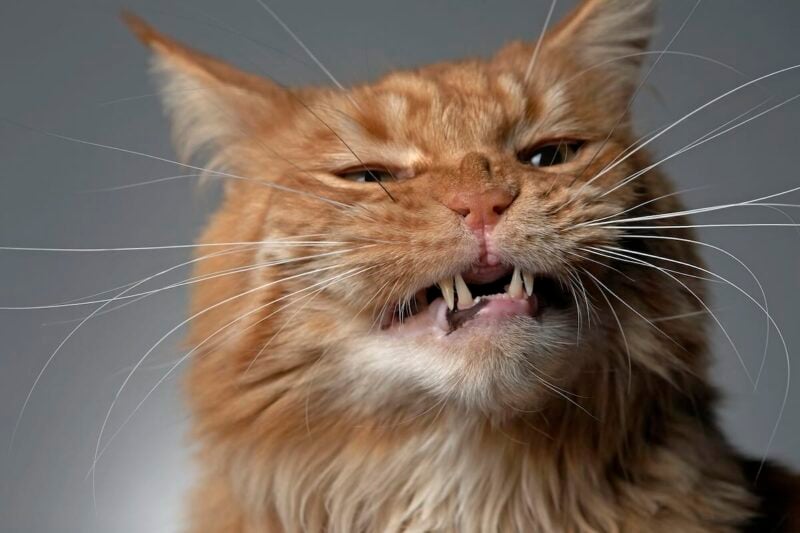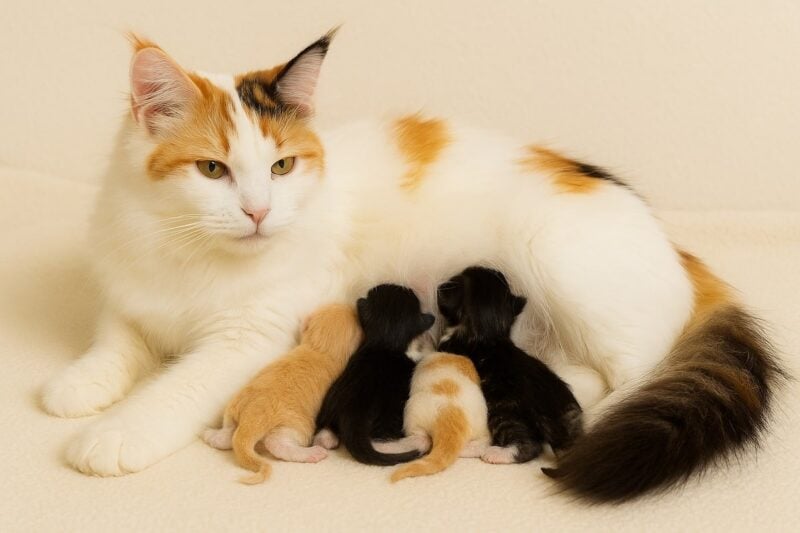Common Maine Coon Skin Problems

If your cat is itching, over-grooming, or has dull, unkempt fur, they may have skin problems.
In most cases, a Maine Coon’s skin problem can be cleared up through proper hygiene, nutrition, and medication. However, sometimes your cat’s skin issues may indicate a more serious underlying condition.
Maine Coons Skin Problems
Maine Coons can suffer from a variety of skin conditions, which can lead to dry, irritated, oily, or inflamed skin. Parasites, infections, untreated wounds, or even allergies can lead to skin problems. Malnutrition and dehydration can also cause your cat’s skin and fur to become too dry or too oily.
If your Maine Coon’s fur appears unkempt, matted, or dull, this could be a sign of an underlying medical condition.
Unfortunately, just like any other cat, Maine Coons can develop a variety of skin problems. Below is a guide to the various skin conditions these cats suffer from:
Parasites
Scabs on the neck, back, or other areas can indicate problems with parasites. Fleas, ticks, mites, and other pests can wreak havoc on your cat’s skin and fur.
This is the correct method for applying flea treatment to your Maine Coon cat.
Infections
Fungal and bacterial infections such as ringworm or staph can be irritating at best, and deadly at worst.
An untreated wound can lead to a serious bacterial infection, so it is important to keep an eye out for any scabs or scratches, especially if you allow your cat outdoors.
This brings us to the emotive question are Maine Coon cats allowed outside?
Dandruff
Normally, a cat sheds dead skin cells as it grooms itself, but in a Maine coon, dry skin, oily skin, or other problems can cause a buildup of dead skin cells, which are shed in flakes of dandruff.
Be cautious, because dandruff can be a sign of an underlying problem like malnutrition or hyperthyroidism.
Here are 7 reasons why your Maine Coon cat has dandruff.
Acne
Cats can develop acne on their face, particularly around the chin and cheeks.
If left untreated, acne can lead to dangerous infections, so it is important to discuss this condition with your vet.
Here are the common causes of Maine Coon acne, and what you can do to treat it.
Grooming Problems
As cats get older, they have a harder time grooming their coat.
Sick cats, cats in pain, or cats suffering from obesity can all have difficulties with grooming, as well. This can cause the coat to become matted and dirty, leading to irritated skin.
Make sure you are using these top 5 Maine Coon cat brushes, to keep your feline’s fur in tip-top condition.
Underlying Health Problems
In some cases, your cat’s skin problems could be a sign of a more serious health condition.
Hyperthyroidism, for example, can lead to dry skin and dandruff, while cancers can lead to sores or lumps on the skin.
That is why it is important to take your cat to the vet even for seemingly simple skin conditions, so you can rule out anything serious (source 1,2).
Causes Of Dry Skin
Dry skin may not seem like a huge problem at first, but it can lead to a lot of itching, irritation, and pain if left untreated.
Dry skin can also indicate a more serious underlying problem, so it is important to find out the cause of your cat’s dry skin as soon as possible.
Here are the main causes of Maine Coon dry skin:
1. Dehydration
Cats evolved from wild, desert-dwelling ancestors, who relied mostly on prey for their source of water.
As a result, cats today are not as good at drinking readily available water, especially if the water is stale or old.
2. Low Humidity
Like humans, cats can suffer from dry skin if they live in arid conditions.
Dry air is most common during the winter months, and it can cause skin problems and even exacerbate asthma in some cats.
Humidifiers are a great way to alleviate dry air.
Since heat can be an issue for some Maine Coons, you might be interested to discover if Maine Coon cats can live in India. Click here to find out the surprising facts.
3. Poor Nutrition
Cat’s skin remains moisturized through natural oils, but their skin cannot secrete as many of these oils if they are not provided proper nutrition.
Protein, fats, and omega fatty acids are essential to healthy, hydrated skin.
4. Frequent Bathing
While Maine Coons tend to love water, that does not mean you should bathe your cat too frequently!
Most cats never need baths at all, and if you do bathe your cat, you should only do so every month or so.
Bathing too often can dry out your cat’s skin, and you should also be mindful of any soaps or shampoos you use.
You should only ever use shampoos or soaps that are specifically made for cats, or else this can lead to skin and fur damage.
These are the best cat shampoos on the market and are safe for your treasured Maine Coon cat.
5. Improper Grooming
If your cat is unable to groom itself due to old age, obesity, arthritis, or any other problem, then it can lead to some serious problems.
As cats groom themselves, they naturally distribute oils across their skin and fur, which keeps their fur moisturized and healthy.
Lack of grooming can also cause mats, dandruff, and many other problems.
In cases such as this, make sure you help your Maine Coon cat by grooming them with these well-reviewed brushes.
6. Underlying Health Conditions
Unfortunately, some serious health conditions like diabetes, hyperthyroidism, and even cancer can lead to skin problems, although these are typically rare.
There are also some skin conditions, like eczema, which can cause dry skin.
Atopic dermatitis in cats is one kind of eczema that causes dry, scaly, and itchy skin.
Consult your vet if your cat’s skin appears inflamed or irritated, especially if you notice any other worrying symptoms like lethargy or diarrhea.
These are the likely causes of Maine Coon diarrhea, and how to treat it (source 1).
How To Treat Dry Skin On A Cat
Dry skin in Maine Coons can have many potential underlying causes, so you should consult your vet before making any drastic changes to your cat’s environment.
However, there are still small changes you can make that can have a great impact on your cat’s overall health, including dry skin.
These changes include the following:
1. Nutrition Changes
All cats should be kept on a high-quality diet, but this is especially true for Maine Coons, who are large and highly active.
Make sure you are giving your cat food that is high in protein and low in carbohydrates.
It should also contain a moderate amount of fat, as well as all of the essential vitamins and minerals that cats need to stay healthy.
You can also consider adding fatty acid supplements, but you should confer with your vet first.
2. Hydration
You can help keep your cat more hydrated by providing constant access to fresh, clean water.
It is also a good idea to provide wet food about two or three times a week, as cats in the wild get most of their water from prey.
Finally, consider adding a humidifier or two to your home, particularly in the winter, when it is driest.
3. Regular Brushing
Most Maine Coons should be brushed two to three times a week, or more during shedding season.
Brushing your cat will distribute their natural oils across their skin and fur, keeping their coat moisturized and healthy.
If your cat struggles to groom itself properly, though, you should brush them more frequently.
For those of you wondering how to get rid of cat dandruff, regular brushing is also a great way to remove any buildup of dead skin cells.
These are the reasons your cat suffers from dandruff.
4. Proper Bathing
You should only bathe your Maine Coon once every month or so, maximum. This is why.
Most cats should not need to be bathed at all unless they require special shampoo treatment, or if they spend a lot of time outside.
Since bathing your cat can dry out their skin, even more, you might be wondering, should I wash my cat if it has dandruff?
Fear not, there are lots of home remedies for dry skin on cats that are best applied during bathing, such as olive oil.
Special dandruff shampoos can also help, but you should make sure to find a shampoo that is gentle and specifically made for cats.
Maine Coons can contract fleas just like any other cat, but they are especially prone to fleas if they are allowed outside.
Use a monthly flea treatment to prevent and eliminate flea infestations in your cat.






